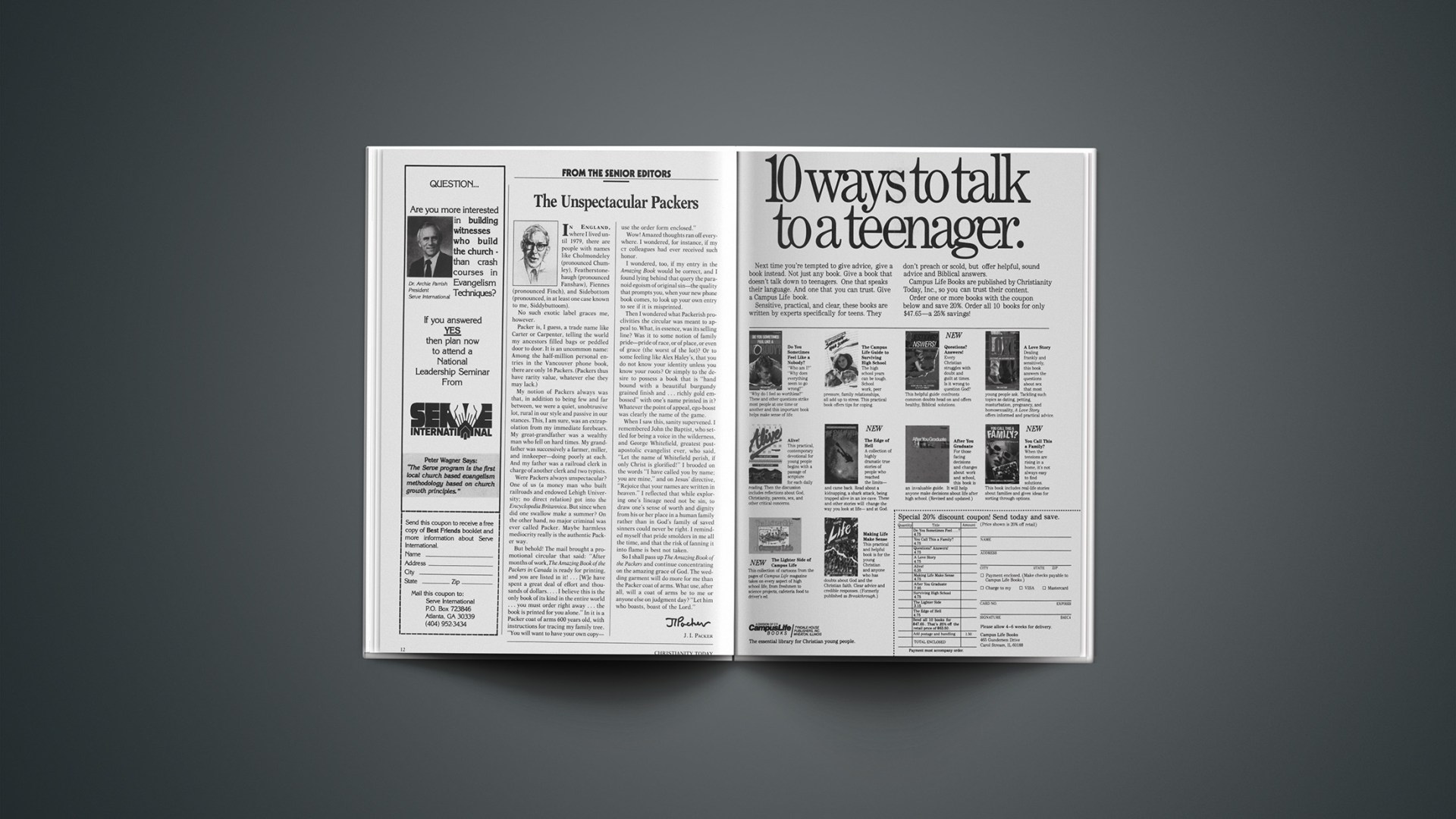In England, where I lived until 1979, there are people with names like Cholmondeley (pronounced Chumley), Featherstonehaugh (pronounced Fanshaw), Fiennes (pronounced Finch), and Sidebottom (pronounced, in at least one case known to me, Siddybuttoom).
No such exotic label graces me, however.
Packer is, I guess, a trade name like Carter or Carpenter, telling the world my ancestors filled bags or peddled door to door. It is an uncommon name: Among the half-million personal entries in the Vancouver phone book, there are only 16 Packers. (Packers thus have rarity value, whatever else they may lack.)
My notion of Packers always was that, in addition to being few and far between, we were a quiet, unobtrusive lot, rural in our style and passive in our stances. This, I am sure, was an extrapolation from my immediate forebears. My great-grandfather was a wealthy man who fell on hard times. My grandfather was successively a farmer, miller, and innkeeper—doing poorly at each. And my father was a railroad clerk in charge of another clerk and two typists.
Were Packers always unspectacular? One of us (a money man who built railroads and endowed Lehigh University; no direct relation) got into the Encyclopedia Britannica. But since when did one swallow make a summer? On the other hand, no major criminal was ever called Packer. Maybe harmless mediocrity really is the authentic Packer way.
But behold! The mail brought a promotional circular that said: “After months of work, The Amazing Book of the Packers in Canada is ready for printing, and you are listed in it!… [W]e have spent a great deal of effort and thousands of dollars.… I believe this is the only book of its kind in the entire world … you must order right away … the book is printed for you alone.” In it is a Packer coat of arms 600 years old, with instructions for tracing my family tree. “You will want to have your own copy—use the order form enclosed.”
Wow! Amazed thoughts ran off everywhere. I wondered, for instance, if my CT colleagues had ever received such honor.
I wondered, too, if my entry in the Amazing Book would be correct, and I found lying behind that query the paranoid egoism of original sin—the quality that prompts you, when your new phone book comes, to look up your own entry to see if it is misprinted.
Then I wondered what Packerish proclivities the circular was meant to appeal to. What, in essence, was its selling line? Was it to some notion of family pride—pride of race, or of place, or even of grace (the worst of the lot)? Or to some feeling like Alex Haley’s, that you do not know your identity unless you know your roots? Or simply to the desire to possess a book that is “hand bound with a beautiful burgundy grained finish and … richly gold embossed” with one’s name printed in it? Whatever the point of appeal, ego-boost was clearly the name of the game.
When I saw this, sanity supervened. I remembered John the Baptist, who settled for being a voice in the wilderness, and George Whitefield, greatest post-apostolic evangelist ever, who said, “Let the name of Whitefield perish, if only Christ is glorified!” I brooded on the words “I have called you by name; you are mine,” and on Jesus’ directive, “Rejoice that your names are written in heaven.” I reflected that while exploring one’s lineage need not be sin, to draw one’s sense of worth and dignity from his or her place in a human family rather than in God’s family of saved sinners could never be right. I reminded myself that pride smolders in me all the time, and that the risk of fanning it into flame is best not taken.
So I shall pass up The Amazing Book of the Packers and continue concentrating on the amazing grace of God. The wedding garment will do more for me than the Packer coat of arms. What use, after all, will a coat of arms be to me or anyone else on judgment day? “Let him who boasts, boast of the Lord.”










